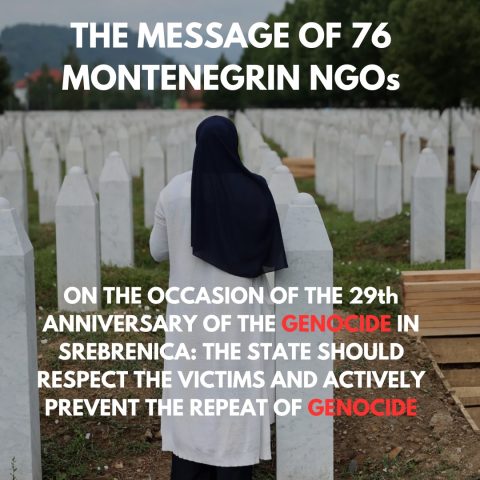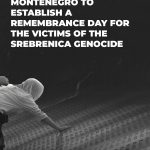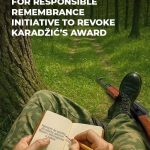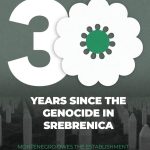
COMMEMORATIVE GATHERING ON ‘GOLI OTOK’ – 75 YEARS SINCE THE ARRIVAL OF THE FIRST PRISONERS
10/07/2024
JAKŠIĆ STOJANOVIĆ SHOULD REMAIN AS MINISTER OF EDUCATION
12/07/2024THE MESSAGE OF 76 MONTENEGRIN NGOs ON THE OCCASION OF THE 29th ANNIVERSARY OF THE GENOCIDE IN SREBRENICA: THE STATE SHOULD RESPECT THE VICTIMS AND ACTIVELY PREVENT THE REPEAT OF GENOCIDE

On the occasion of the 29th anniversary of the genocide in Srebrenica, 76 NGOs which advocated that Montenegro co-sponsor the UN resolution on the International Srebrenica Genocide Remembrance Day are paying tribute to the victims of said genocide, expressing solidarity with their families and the survivors, and demanding the following from the authorities of Montenegro:
– To introduce the Srebrenica Genocide Remembrance Day and ensure its regular official observance in accordance with:
The UN Resolution declaring 11 July the international day of remembrance of the 1995 genocide in Srebrenica,
The Resolution of the National Assembly of Montenegro on the genocide in Srebrenica from 2021, and
The Declaration of the National Assembly of Montenegro on acceptance of the Resolution of the European Parliament on Srebrenica from 2009;
– To ensure that history textbooks for appropriate age groups are supplemented with objective information about this crime and the role of Montenegro in the wars that took place in the territory of former Yugoslavia in the 1990s;
– To find and prosecute the unpunished perpetrators and accomplices of the genocide in Srebrenica and other war crimes;
– To condemn and suppress denial of genocide, glorification of its perpetrators, and any other form of hate speech that represents the last stage of genocide and prelude to new conflicts and crimes;
– To support programmes that enable dealing with the past and promotion of human rights, especially the prohibition of discrimination and suppression of all forms of hatred and intolerance in accordance with the Constitution of Montenegro;
– To put more effort into the process of reconciliation in the region based on dealing with the past and respecting the rights of victims of genocide, crimes against humanity and war crimes.
We remind that, since 11 July 1995, the Army of the Republic of Srpska, under the leadership of Ratko Mladić, killed more than 8,000 men and boys of Bosniak nationality in mass executions in the area of Srebrenica. This was the most massive crime that was committed on European soil after the Second World War.
This crime was established by the judgments of the International Criminal Tribunal for former Yugoslavia (ICTY) and the International Court of Justice (ICJ). The national courts of Bosnia and Herzegovina, Serbia, Croatia, Germany, Austria, Switzerland and the Netherlands also found that in Srebrenica, in July 1995, members of the Army of the Republic of Srpska and the special units of the Republic of Serbia (the “Scorpions”) committed genocide and other war crimes.
The ICTY and the International Residual Mechanism convicted 21 persons for the crimes committed in Srebrenica, 7 of them for the crime of genocide based on more than 1,500 testimonies and approximately 28,000 pieces of evidence. In Bosnia and Herzegovina, 31 persons were finally convicted for the same crimes, 14 of them for genocide. Also, five persons were convicted n Serbia, and two in Croatia. We emphasise that the question of whether or not genocide was committed is an exclusively legal and not a political category. A total of 46 judges from 34 countries took part in determining responsibility for the genocide in Srebrenica before the ICTY, in two-instance proceedings. Fifteen judges from different countries took part in bringing in the ICJ verdict.
So far, Montenegro has adopted the Declaration on the acceptance of the resolution of the European Parliament (EP) on Srebrenica of 2009, and the Resolution on the genocide in Srebrenica of 2021, condemning the genocide in the strongest terms; it voted for the UN resolution on the International Srebrenica Genocide Remembrance Day and dismissed its Minister of Justice, Human and Minority Rights, Vladimir Leposavić, due to its relativisation. These were all correct steps towards a safer future for our country and the region in the European Union.
On the other hand, pro-Serbian nationalist parties, which unfortunately deny this genocide and use every opportunity to unjustifiably politicise it, also participate in the government in Montenegro. We oppose their “a crime for a crime” policy, we condemn the adoption of “counter resolutions”, and we do not want new generations to grow up filled with hatred and a feeling of provincial inferiority that clashes with the entire world, starting with closest neighbours.
We must all take responsibility for shaping a future in which upcoming generations will be spared further suffering. Victims of crimes oblige us to advocate for justice, truth and reconciliation, and to actively create a society that respects every person, regardless of their national, religious or ethnic affiliation.
Although people who refuse to accept unpleasant facts will always be around, the progress of any society requires that we face the truth and deal the past.
On 11 July, representatives of our organisations will join the commemoration of the Srebrenica Remembrance Day, organised by the Bosniak Council of Montenegro in the Civilian Victims’ Memorial Park in Pobrežje, Podgorica.
Signed by (in alphabetical order):
- Akcija za ljudska prava [Human Rights Action] – HRA, Tea Gorjanc Prelević
- Aktivna zona [Active Zone], Miloš Marković
- Agencija za lokalnu demokratiju [Agency for Local Democracy], Kerim Međedović
- Antifašisti Cetinja [Antifascists of Cetinje], Filip Kuzman
- Asocijacija Spektra [Spectra Association], Jovan Ulićević
- Balkanski sektor [Balkan Sector], Aner Salihović
- Bona fide, Pljevlja, Sabina Talović
- Bošnjački kulturni centar [Bosniak Cultural Centre], Kemal Zoronjić
- Centar za žensko i mirovno obrazovanje [Centre for Women’s and Peace Education] ANIMA, Ervina Dabižinović
- Centar za građansko obrazovanje [Centre for Civic Education] – CGO, Daliborka Uljarević
- Centar za demokratiju i ljudska prava [Centre for Democracy and Human Rights] – CEDEM, Nevenka Vuksanović
- Centar za demokratsku tranziciju [Centre for Democratic Transition] – CDT, Milica Kovačević
- Centar za ženska prava [Centre for Women’s Rights] – CŽP, Maja Raičević
- Centar za monitoring i istraživanje [Monitoring and Research Centre] – CeMI, Zlatko Vujović
- Centar za građanske slobode [Centre for Civil Liberties] – CEGAS, Marija Popović Kalezić
- Centar za razvoj nevladinih organizacija [Centre for the Development of Non-Governmental Organisations] – CRNVO, Zorana Marković
- Centar za multimedijalnu produkciju [Multimedia Production Centre] – CEZAM, Blagota Marunović
- Centar za afirmaciju RE populacije [Centre for the Affirmation of the Roma and Egyptian Population] – CAREP, Nardi Ahmetović
- Centar za obuku i obrazovanje [Training and Education Centre], Aleksandra Radoman Kovačević
- Centar za romske inicijative [Centre for Roma Initiatives], Fana Delija
- Centar za zaštitu i istraživanje ptica [Centre for Protection and Research of Birds] – CZIP, Jovana Janjušević
- Centar za ekonomske i evropske studije [Centre for Economic and European Studies] – CEES, Nenad Vujošević
- Centar za kulturu [Cultural Centre] Bihor, Mirsad Rastoder
- Crnogorska LGBTIQ asocijacija Kvir Montenegro [LGBTIQ Association Queer Montenegro], Staša Baštrica
- Crnogorski PEN centar [Montenegrin PEN Centre], Boban Batrićević
- Crnogorski ženski lobi [Women’s Lobby of Montenegro], Aida Petrović
- Crnogorski komitet pravnika za ljudska prava [Montenegrin Committee of Lawyers for Human Rights], Velija Murić
- Eduko plus, Almedina Dodić
- ERA – Savez za jednaka prava LGBTI osoba na Zapadnom Balkanu i u Turskoj [Alliance for equal rights of LGBTI persons in the Western Balkans and in Turkey], Danijel Kalezić
- Djeca Crne Gore [Children of Montenegro], Sabra Decević
- Društvo crnogorskih izdavača [Association of Montenegrin Publishers], Prof. Dr. Vladimir Vojinović
- Građanska inicijativa “21. maj“ [Civic Initiative “21 May”], Rade Bojović
- Građanska alijansa [Civil Alliance], Milan Radović
- Husein Paša, Emir Pilav
- Husein Paša – Pljevlja, Denijal Geljić
- Ikre, Rožaje, Velida Hodžić
- Institut za medije Crne Gore [Media Institute of Montenegro], Olivera Nikolić
- Institut za rodnu ravnopravnost [Institute for Gender Equality] “Dulcinea”, Ulcinj, Hatixha Gjoni
- Inicijativa mladih za ljudska prava [Youth Initiative for Human Rights], Edina Hasanaga Čobaj
- Inicijativa za regionalnu saradnju Crne Gore (Igmanska inicijativa) [Regional Cooperation Initiative of Montenegro (the Igman Initiative)], Andro Martinović
- Ipso Facto, Milena Popović Samardžić
- Juventas, Ivana Vujović
- Korifej teatar [Korifej Theatre], Zoran Rakočević
- LINK – Crnogorska mreža za smanjenje štete [Montenegrin Harm Reduction Network], Ranko Dacić
- Monitoring Group Ulcinj – Mogul, Xhemal Peroviq
- Most kulture [Culture Bridge], Ivan Jokanović
- Naša akcija [Our Action], Kotor
- Novi horizont [New Horizon],Ulcinj, Nazif Velić
- Opštinsko udruženje multiple skleroze Bijelo Polje [Municipal Multiple Sclerosis Association of Bijelo Polje, Lidija Guberinić
- Plan B, Alen Poljak
- Poligon za žensku izuzetnost [Female Excellence Polygon] – Sofija, Rebeka Čilović
- Prazan prostor [Empty Space], Marija Backović
- Prima, Aida Perović
- Prvi ženski ekološki pokret u Crnoj Gori – Ekopatriotizam [First Women’s Ecological Movement in Montenegro – Ecopatriotism], Ivana Čogurić
- Punta institut [Punta Institute], Ulcinj, Admir Gjoni
- Razvoj Vranj [Development Vranj], Tuzi
- Romska organizacija mladih “Koračajte sa nama – Phiren Amenca” [Roma Youth Organisation “Walk with Us – Phiren Amenca”,Elvis Beriša
- Savez za djecu i mlade “Kuća” [Association for Children and Youth “House”], Pavić Radović
- Sigurna ženska kuća [Safe Women’s House], Budislavka Mira Saveljić
- Sistem [System], Neda Radović
- SOS telefon [SOS hotline] Rožaje, Raza Nurković
- Srce [Heart], Dušan Rakočević
- Studentska organizacija [Student Organisation] Adamas
- Udruženje “Štrpci – Protiv zaborava” [Association “Štrpci – Against Forgetting”], Demir Ličina
- Udruženje pravnika Crne Gore [Lawyers’ Association of Montenegro], Branislav Radulović
- Udruženje profesora istorije [Association of History Professors] HIPMONT, Miloš Vukanović
- Udruženje LBTQ žena [Association of LBTQ Women] “Stana”, Ana Dedivanović
- Udruženje roditelja [Parents’ Association] OAZA,Rasema Hekalo
- Udruženje “Pravozastupnik” [Association “Legal Representative”], Budislav Budo Minić
- Udruženje mladih sa hendikepom Crne Gore [Association of young people with disabilities of Montenegro], Marina Vujačić
- Udruženje likovnih umjetnika Crne Gore [Association of Fine Artists of Montenegro], Svetlana Dragojević
- Udruženje za podršku Roma i Egipćana [Association for the Support of Roma and Egyptians], Berane, Sultan Beća
- Ulcinj Info, Mustafa Canka
- Forum MNE, Elvira Hadžibegović
- Forum Bošnjaka Crne Gore [Forum of Bosniaks of Montenegro], Husein Ceno Tuzović
- 35mm, Darko Ivanović







 English
English Montenegrin
Montenegrin